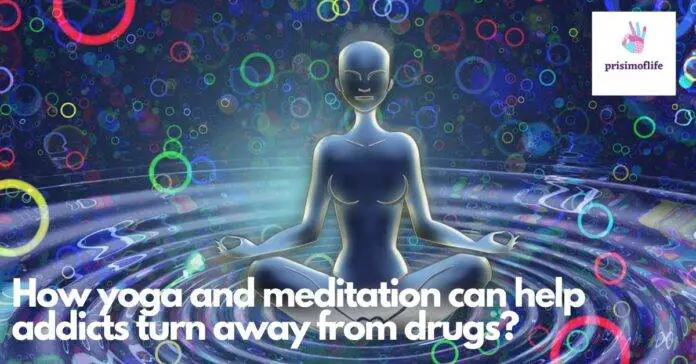
Have you ever wondered how yoga and meditation can help addicts turn away from drugs? Drug abuse can happen to anyone, but no one wants to think about it happening to them or someone they love. Drug addiction can result in devastating consequences, whether you’re taking illicit drugs, prescription painkillers, or smoking marijuana and e-cigarettes. Whether you’re addicted or think you might be, there are many different ways to seek help and find the healing that doesn’t involve drugs. One such alternative to drug use is practicing yoga and meditation.
Addiction to drugs and alcohol can take many forms and produce devastating physical and psychological consequences. According to The Huffington Post, one of the most effective methods of weaning yourself off these substances is through yoga and meditation. While these practices have long been considered worthy methods of achieving inner peace, they also can help addicts detach from their substance dependencies. Let’s look at some of the ways yoga and meditation can serve as alternatives to drug use, as well as the effectiveness of these practices in rehabilitation.
Meditation Reduces Stress
Yoga and meditation are not just effective stress management strategies. Research suggests that mindfulness practices like these might reduce drug cravings in recovering addicts. A small study published in The Journal of Psychoactive Drugs found that mindfulness exercises helped people resist a cigarette craving.
In contrast, a different study presented at an American Psychiatric Association meeting found preliminary evidence that mindfulness training could help people deal with their nicotine addiction by improving self-control. If you or someone you know is struggling with addiction, perhaps yoga or meditation could be an option to explore. You might be surprised to find out how much it changes your life for the better!
Yoga Builds Focus
Yoga is a great way to build focus, essential in overcoming addiction. Yoga requires an intense level of concentration, so you’ll be able to get your mind off of any cravings you may have and refocus on yourself. In addition, many yoga exercises also force you to go slower—which helps your body be more mindful about how it moves and how it consumes space.
Overall, by teaching you how to go at a slower pace with both your body and mind, yoga may serve as an effective alternative for struggling with drug use.
Mindfulness Meditation Reduces Cravings
Meditation teaches us to focus our attention on one thing at a time, whether it’s our breath or an idea. That sort of mindfulness helps people avoid distractions, such as giving in to cravings when they’re on a diet or distracting themselves with drugs when they’re feeling down.
Meditation may also be associated with increases in brain activity in regions that control attention and craving; if you feel cravings while meditating, simply returning your focus to your breathing should be enough to stop them.
Yoga Exercises Help Overcome Pain
Yoga exercises help overcome chronic pain by allowing your body to take a break from stress, anxiety, and negative thoughts. Yoga also offers self-treatment methods which allow your body to regulate its own pain.
Learning how to relax is one of the best things you can do for yourself if you suffer from chronic pain, so look into taking up a local class at a studio or through an online video service. You might also consider learning guided relaxation techniques on your own. You may be surprised by how quickly these techniques pay off when it comes to relieving acute aches and pains!
Yoga Strengthens the Body and Mind
Staying fit and healthy isn’t just about running on a treadmill or lifting weights. It’s about maintaining balance in your life, including your emotional health, which is why you should try incorporating activities like yoga and meditation into your routine. Yoga, in particular, has been found to be beneficial for people with addictive personalities because it teaches people how to control their impulses.
In fact, scientists have found that regular activity like yoga may decrease an individual’s likelihood of developing addictive behaviors later in life by strengthening self-control.
(1). That being said, if you are addicted to drugs or alcohol, it is best to seek professional help before attempting alternative therapies such as exercise or mediation
(2). You may still benefit from physical activity, though!
Yoga Helps with Sleep
Studies have found that when you’re having trouble sleeping, incorporating a session of yoga into your day helps regulate melatonin production. Melatonin is a sleep hormone that controls sleep cycles, and many people who struggle with insomnia are thought to have lower levels of it. As such, it’s possible that incorporating some simple stretching exercises into your daily routine may help ease your body into a more restful pattern.
Benefits of Meditation in Sobriety
Meditation can be a powerful tool for sobriety. In fact, many treatment centers offer regular mindfulness programs to their patients as part of a holistic rehabilitation program. In addition, a number of studies have demonstrated that people who meditate tend to abuse substances less often than those who don’t.
Conclusion
The above-stated discussion highlights How yoga and meditation can help addicts turn away from drugs? Therefore, if anyone suffering from drug addiction can easily transform his ways of living by adding yoga to his life.
Suggested Articles: https://prisimoflife.com/2022/01/28/how-long-do-you-hold-a-yoga-pose/ https://prisimoflife.com/2022/01/27/why-goat-yoga-is-bad/










